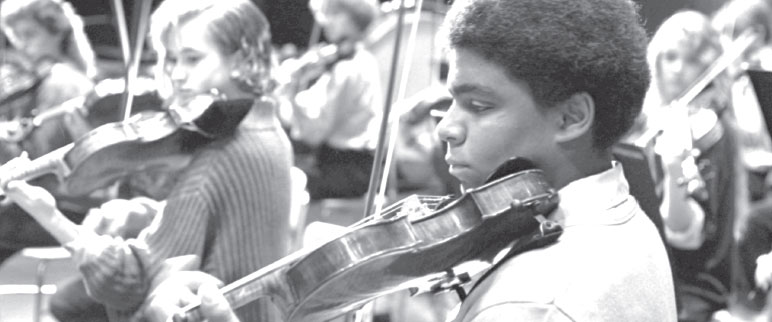Aaron Dworkin, arts entrepreneur and diversity advocate, returns to U-M as the new dean of the School of Music, Theatre & Dance.
While Aaron Dworkin’s resume has boasted many titles—violinist, poet, diversity advocate, MacArthur Fellow, President Obama’s first nominee to the National Council on the Arts—“higher education administrator” hasn’t been one of them. That is, until this summer.
In July, Dworkin, ’97, MMUS’98, assumed the position of dean at the U-M School of Music, Theatre & Dance (SMTD), coming full circle back to the University where some of his most crucial personal and professional successes took root.
He is best known as the founder and president of the Detroit-based Sphinx Organization, where he worked to increase the percentage of black and Latino classical musicians in the nation’s top U.S. orchestras. That work won Dworkin $500,000 in unrestricted funds—a so-called “genius grant”—from the John D. and Catherine T. MacArthur Foundation in 2005.
Dworkin’s hiring puts a fresh spotlight on the SMTD, which already enjoys a strong reputation; its musical theater program in particular is considered one of the nation’s best. Dworkin hopes to raise profiles across all of the departments and develop partnerships with other U-M programs, like the Ross School of Business, to expand learning opportunities for performing arts students.
In 1997 Paul Boylan, then dean of the SMTD, was approached by a violin student with an audacious plan to launch a competition for minority classical musicians
“We need to look at what are the entrepreneurial skill sets our grads are going to need,” Dworkin says. “Are we creating an environment that enables them, at a time when they are kind of protected here (at the University) to be creative and innovative, and then build on that after they graduate?”
Dworkin’s emphasis on diversifying the underpinnings of a performing arts degree is spot on, says Robert Lynch, president and chief executive of the nonprofit Americans for the Arts in Washington, D.C. Audiences today are broader than what can be measured by ticket sales to live performances, Lynch says. One example: online downloads for classical music, which are soaring.
“We don’t necessarily have a declining interest in the arts, but people want their art in different packages,” Lynch says. “People like Aaron understand that.” U-M has an opportunity to be a leader in reimagining the role higher education can play in training artists who are both technically skilled and ready to put their talents to use in new and inventive ways, Lynch says. “That’s a perspective that performing arts schools must have if they’re going to survive.”
Dworkin was born in Monticello, New York, to a white Catholic mother and a black Jehovah’s Witness father. (He began searching for his birth family in his early teens, finding them 16 years later.) Barry and Susan Dworkin, both white Jewish neuroscientists, adopted him and lived first in New York City and later in Hershey, Pennsylvania. Dworkin began playing the violin at age 5, studying with noted teachers, including Vladimir Graffman, and at the Peabody Institute. He performed regularly with local youth orchestras.
While his musical talent flourished, Dworkin’s teen years were tumultuous. In his largely homogeneous hometown, Dworkin says he often felt isolated and lonely, dismissed as “the black kid with the afro who plays the violin.”
A crucial turning point came when his parents encouraged him to attend Interlochen Arts Academy in northern Michigan for the last two years of high school. For the first time, Dworkin was surrounded by peers with similar interests and passions.
“Interlochen saved my life,” Dworkin says. “And the University of Michigan built my life.”

The affection his high school alma mater feels for Dworkin is mutual, says Jeffrey Kimpton, president of the Interlochen Center for the Arts. “Aaron is a creative, alternative thinker who has done such amazing work,” he says. “We believe great things will happen at Michigan.”
To be sure, it wasn’t a straight line from Interlochen to U-M. He spent two years as a business major at Penn State University and worked a variety of jobs, eventually landing in Ann Arbor. Being in close proximity to the University convinced him, at age 23, to return to college.
Once on campus and in class, Dworkin was exposed for the first time to the works of African-American classical composers like William Grant Still. That new knowledge was both elating and frustrating. Dworkin wondered what his own early artistic trajectory might have been if he had known there were such role models. Why weren’t more minority performers in top orchestras, Dworkin wondered, and what could be done to change that?
In 1997 Paul Boylan, then dean of the SMTD, was approached by a violin student with an audacious plan to launch a competition for minority classical musicians. “Aaron was a bright, ambitious, young man,” Boylan says. “What he wanted to do was challenging. I recall saying ‘This is going to be tough.’”
But Dworkin rallied the support he needed against significant odds and eventually built Sphinx into a highly regarded organization. Those are skills that will serve him well in his new position, Boylan says. “The dean has to be a forceful spokesman for the needs of the school. Aaron is going to be very, very good at that.”
There’s little question that the Sphinx organization has had a remarkable impact. Since the first competition was held in 1998, according to Sphinx, the percentage of black and Latino musicians in the nation’s top orchestras has doubled to 4 percent from 2 percent. Sphinx’s role in that growth is well documented, as many of the new additions to the orchestral rosters are its alumni. While Dworkin is proud of those numbers, he emphasizes, “we still have a long way to go.”
Sphinx’s mission is also to cultivate the next generation of classical musicians. The Overture Program provides classical violins and lessons to public school students in Detroit and Flint, Michigan. Sphinx also has an intensive training academy for aspiring young musicians. The organization estimates that 65,000 children in 175 schools nationwide have benefited from its outreach programs and that more than $2 million has been awarded in scholarships and grants.
Sterling Elliott—a 15-year-old cellist who has been competing in Sphinx’s junior division since age 12, taking first place last year—said participating in the organization’s competitions and workshops has raised his own level of awareness.
“Before I was involved with Sphinx, I watched YouTube videos of famous orchestras, but I never thought about the diversity of the performers,” says Elliott, who listed U-M among his top college choices. “Now, whenever I see a performance, I’m paying attention to it. That’s how you get things to change.”
Dworkin’s appointment represents another change: He’s the first African-American dean of the University’s performing arts school, joining a handful of major U.S. music schools with black or Latino leaders. President Roberto Diaz of the highly regarded Curtis Institute of Music in Philadelphia—which awarded Dworkin an honorary doctorate in 2013—is one of them.
“Mr. Dworkin’s focus on preparing students for real-world challenges in addition to emphasizing technical accomplishment in his new role at the University of Michigan is laudable,” Diaz wrote in an email to Michigan Alumnus about Dworkin’s appointment. “Musicians today no longer just have a responsibility to be excellent performers—they must also be advocates for their art form, bringing arts access to underserved groups, collaborating with a range of artists, exploring new venues, and more.”
Curtis students, including sophomore Ade Williams, are among the past winners of Sphinx competitions. (Her father, Ruben Miller, is an assistant professor at U-M’s School of Social Work.) Sphinx has provided Williams with an extraordinary support network and boosted her confidence that a professional concert career is possible.
“What Aaron’s message is, and the Sphinx mission, is 100 percent perfect,” Williams says. “He’s changed so many people’s lives, and he’s changed the statistics on how many black and Latino musicians are known in the world.”
Dworkin says he would have had a tougher time stepping away from the organization if he weren’t leaving it in such capable hands. Afa S. Dworkin, ’97, MMUS’99, an accomplished violinist and Sphinx’s longtime executive and artistic director, has taken over as president. Afa and Aaron began their professional association, which predates their personal relationship, after meeting in Professor Stephen Shipp’s violin studio class. She was the organization’s first employee.
And while stepping away from Sphinx is bittersweet, the chance to serve the University, which has given him so much, is both humbling and exhilarating.
“I’m incredibly excited for this next adventure,” Dworkin says. “The welcome I’ve received so far has been overwhelming. In many ways it’s a recurrence of what I felt when I first came here as a student. I feel like I’m returning to my community.”
AARON DWORKIN, THE POET
In addition to playing the violin, Aaron Dworkin is well known as a poet and spoken word performance artist, collaborating with such luminaries as cellist Yo-Yo Ma (the artistic adviser to the Sphinx Organization) and actress Anna Deavere Smith, among others. He wrote the following spoken word piece for a Sphinx event marking his transition to U-M dean. He performed it with Jeffrey Ziegler, former cellist of the Kronos Quartet, and Damien Sneed, renowned pianist, organist, producer, and recipient of the Sphinx Medal of Excellence. It’s in tribute to Maya Angelou’s “Still I Rise” and the quote from Shakespeare’s “Twelfth Night,” “If music be the food of love, play on.”
Still Play On
Accolades shower down
Upon my furrowed brow
Descending droplets of gratitude
For that which only in part I deserve.
My violin found me at five
Then saved me at fifteen
I found my way far from stages
Where only streets served as encores
For a piece played on instruments made
From flesh instead of wood and bone
Articulating an ensemble with words my baton
Those soldiers, warriors in unison
Still play on.
Visages of children
Molded into hope
through music that they touched
In a moment free from misery
Where crowds shed tears
In halls unused or unused to color.
Emboldened troubadors told tales
Yet untold or incomplete
Still play on.
Who tires from tireless striving?
Driving through parades of inertia
Driven to change, to feel you’ve changed
More than if your music graced a stage
A melody through cacophony of inequity
Is only realized in harmony
A chord breaking through the discord
Of disconnected voices, I step aside
They play on.
I fear in time only shadows of mine remain
A life’s work not taken but taken on
by others to be work of the lives of others.
They play on.
I play on
Still play on.
Emily Richmond, public editor of the Education Writers Association, lives in Ann Arbor. She’s written for The Atlantic’s Education Channel and The Hechinger Report, among others. She was a Knight-Wallace Fellow at U-M in 2011.





